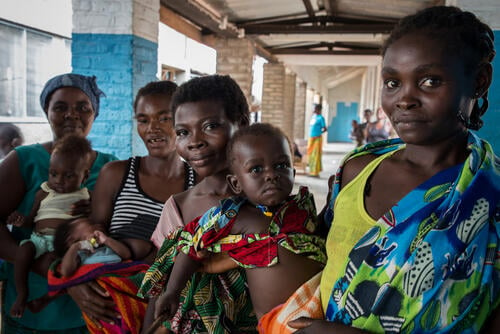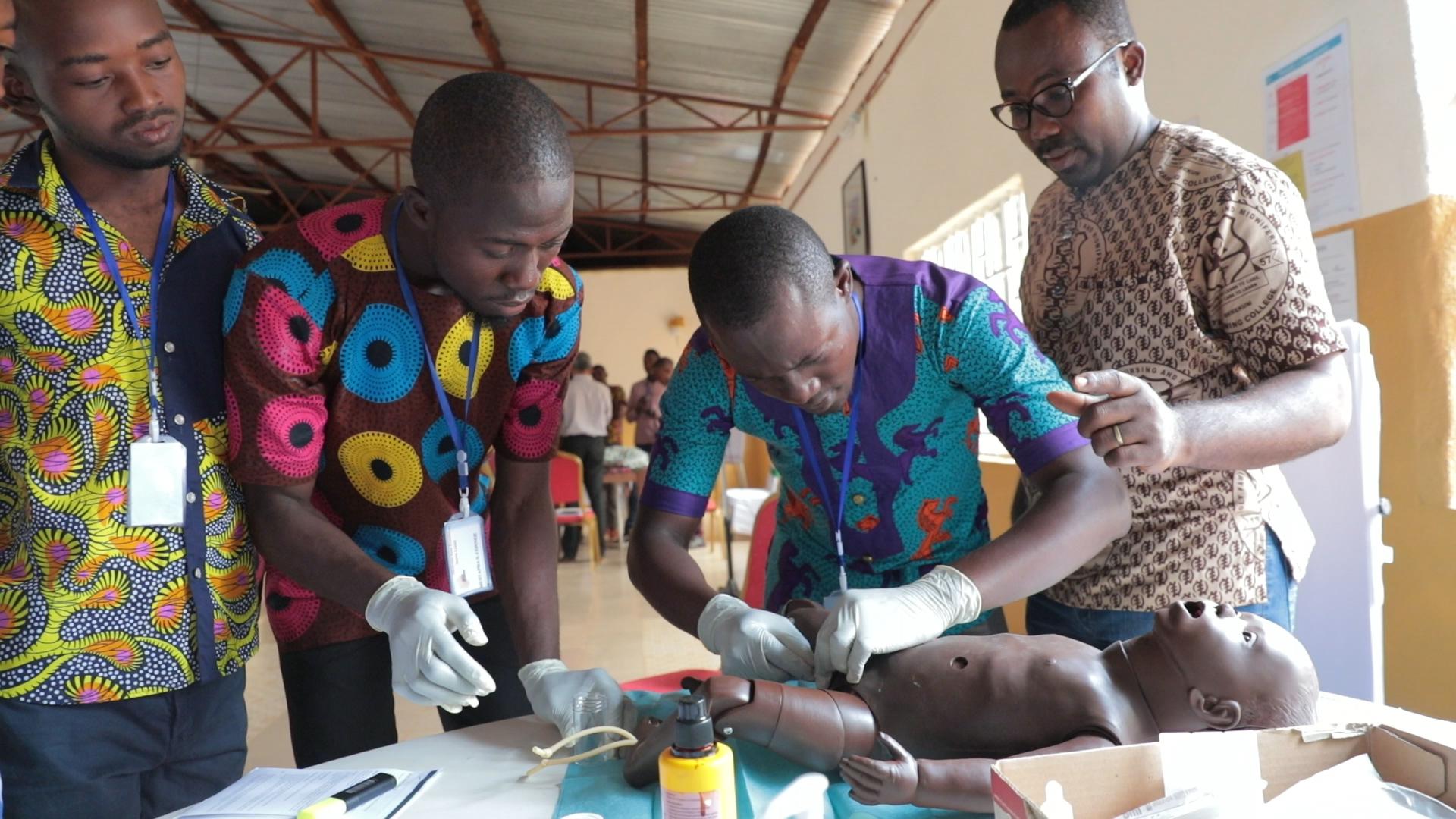
MSF Academy for Healthcare: Bringing professional medical learning to the heart of the field reality
The MSF Academy is implementing targeted medical and paramedical training directly into MSF projects, specifically for MSF employed staff.
About
Over 90 per cent of MSF staff are recruited locally in the areas we work. To ensure we can provide quality care for our patients according to MSF standards and protocols of care, we are investing in the training and upskilling of health workers through the MSF Academy for Healthcare.
Founded in 2017, the MSF Academy for Healthcare is an intersectional training initiative, designed to improve the quality of healthcare provided in MSF projects and to strengthen the local health systems where healthcare human resources are weak. This is achieved through continuous professional development programmes implemented in the projects of all five MSF Operational Centres, and by working with local health and higher education ministries, and schools.
Today the MSF Academy for Healthcare offers continuous professional development in several countries across sub-Saharan Africa, through on-the-job training and theoretical and practical instruction and mentoring, using innovative methodologies.
Read our latest activity report, below.
In the near future, the MSF Academy for Healthcare will focus on five key areas:
- hospital nursing;
- anaesthetic nursing;
- strategic medical management;
- infectious diseases; and
- out-patient department (OPD) consultations.
The initiative remains tuned into potential operational needs that would require a medium- to longer-term response from the MSF Academy, in line with our mission.
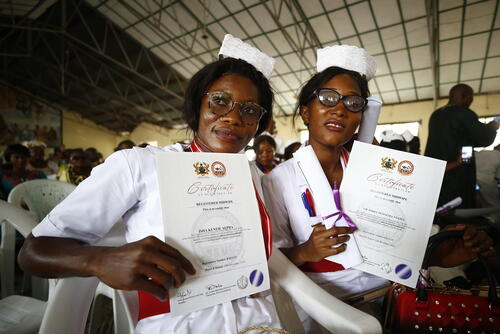
In 2020, progress in all five areas was consolidated:
- Hospital nursing: MSF Academy teams are present in Central African Republic, South Sudan and Sierra Leone. Competency-based learning around the curiculum of Basic Clinical Nursing Care (BCNC) in 11 MSF hospitals.
- For anaesthetic nursing, 16 students are enrolled in an 18-month scholarship programme in Ghana (in English), and 20 students in a 24-month programme in Ivory Coast.
- In the field of strategic medical management, in competency-based learning course for PMR and medical coordinators is in preparation which is planned to start in September 2021.
- For infectious diseases, a Post-Graduate Diploma course is in preparation in collaboration with the Stellenbosch Universty in South Africa which is planned to start in January 2021.
- The OPD curriculum is in development in collaboration with several universities and an MSF validation committee. Several pilot sites are identified and a first implementation will start in Sierra Leone in September 2020.
Pedagogical approach key components
- Competency-based curricula and assessments.
- Student-centred learning: training facilitators are trained to become “guide on the side” rather than “sage on the stage”.
- Work-based learning: which links competency-based curriculum objectives with on-the-job training activities from the start.
- Clinical mentoring: to structure work-based learning and encourage learners to apply their new learning to their work. For each course, professional mentors or tutors accompany the learners as they put their learning into practice, mentoring them at the bedside of the patients as well.
- Flexible delivery strategies: training busy national staff who can rarely leave their project to be trained, or only for a limited period of time is a challenge. The MSF Academy’s goal is to bring the training to them as much as possible, and to progressively promote a learning culture.
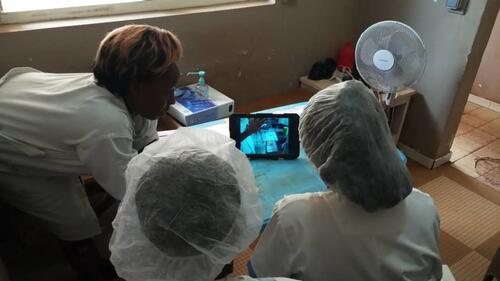
Programmes
Last updated August 2020.
Hospital nursing
Target audience: all staff providing nursing care in MSF projects.
Goal: to increase the quality of care in MSF hospitals through a practice-based training for nurses.
Where: focus on countries where MSF runs hospital projects and faces significant shortages of qualified hospital nurses, with priority given to low-income countries. So far, we have programmes in South Sudan, Central African Republic (CAR), and Sierra Leone.
We have engaged with health and academic authorities in the countries for their recognition of the courses and to potentially certify the curriculum and learning achievements.
General principles:
- on-the-job learning: theoretical and practical sessions with bedside teaching and avoid creating too much disruption on the daily activities of the hospital
- the priority is the immediate improvement of the quality of care: strategies are tailored to each context and readjusted progressively as we learn
- the projects are meant to be agile, to cater for the volatility of the context
The students can be any staff performing nursing or midwifery duties in the structures supported by the participating MSF projects, with no prerequisite.
How:
- All courses have a pragmatic and competency-based approach, directly linked to the quality needs of the projects.
- a full curriculum (Basic Clinical nursing care or BCNC) is being designed for basic nursing skills.
The delivery of the BCNC is based on a cascade system, whereby the MSF Academy clinical mentors will train learning companions (who remain in their operational function/roles), who will in turn become trainers/tutors for their peers (the students).
The activities are supported by various tools: a Learning Journal for students, dictaphones and tablets containing all the training materials to reinforce the bridge between theory and practice.
“What I preferred was the module on the respiratory function, because it was a module I had never understood, and here, we were able to go into details, with videos and games: it is now clearer for me.”
Yannick Agnès Arone-Kossoko, IDE, SICA OCP project, Bangui - Training for Learning Companions, July 2019, Bangui, Central African Republic.
Central African Republic
The Central African Republic has faced a series of crises. Our intervention could have a longer-term impact on the health care situation, all over the country.
- Strategy: the desire to keep an agile and light structure that could immediately produce some results; start small and on a voluntary basis with the goal to progressively create motivation and interest to learn from the peers;
- Implementing the BCNC curriculum while instilling a sustainable learning culture in the projects, ensuring the learning was geared towards bringing an actual change in the daily nursing care provided by the learners.
- thirteen projects across the country are willing to take part in the initiative
- a total of 183 staff members enrolled in the BCNC programme (68 are learning companions), from 7 different project sites of all 4 present operational centres.
South Sudan
There is a severe shortage of qualified medical staff in South Sudan, given the acute disruption to education due to a long period of conflict and the very low level of formal government investment in this field.
The context requires an adapted and flexible strategy, due to heavy operational needs, insecurity and uncertainty.
- Activities started in the Pibor project in the autumn 2019, where all 43 students had undergone the complete classroom training for the first 12 learning units and started the practical and beside training, but unfortunately, the measles outbreak combined with political instability and massive floods led to the suspension of the BCNC programme in Pibor.
- The planning for 2020 was made, and preparations for implementation were started for projects in Old Fangak and Maban, with the CGAs carried out in both places. The calendar and implementation of activities however faced disrutption then suspension, due to the shift in operational activities related to the COVID-19 health crisis.
- In May, an agreement was made with OCG to plan the nursing training in Agok from July, with a specific focus on the new needs due to COVID-19. Discussions have started to organise the planning for the other hospitals later in 2020 or early 2021.
Sierra Leone
Sierra Leone has been hard hit by disease outbreaks and other humanitarian crises for decades, with a healthcare workforce in decifit. In 2019, MSF opened a new hospital in Kenema district, where the MSF Academy worked to ensure that the hospital could benefit from quality staff wthout significantly impacting the healthcare workforce from other running structures.
Nursing scholarship programme
In anticipation of the need for certified nurses and midwives to staff the future Kenema hospital (specialising in paediatric and maternity care), 50 Sierra Leonean health workers were selected for a two-year scholarship programme. Twenty-two students graduated as certified nurses in December 2019 from Korle-Bu nursing school and integrated into the Kenema hospital team in early 2020.
Twenty-five students graduated as certified midwives in December 2019 from Koforidu midwifery School and enlisted in a rotation programme in various health structures, before integrating the Kenema hospital for its Phase 3 opening.
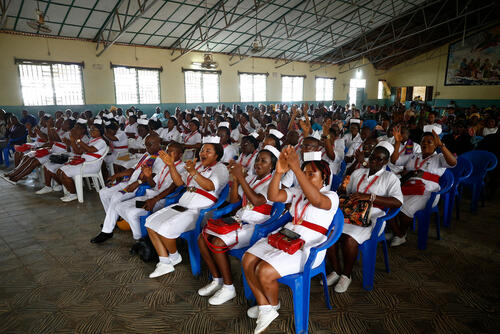
Intensive competency-refresher training prior to the opening of the first phase of the new hospital
To prepare the 162 newly hired healthcare workers and ensure the minimum knowledge and skills required to start working in the hospital, including MSF procedures, all staff followed an intensive six week programme.
On-the-job training of nursing staff in the Kenema hospital
A series of short CPD courses were prepared and provided in the hospital, following specific requests from medical teams.
A full BCNC programme for all nursing staff within the hospital, tailoring some of the content to paediatric specificities; started in December 2019. Their baseline knowledge and skills were evaluated with a competency gap assessment (CGA). Throughout 2020, more than 75 nurses and 40 nurse aides will go through the BCNC programme.
Clinical Health Officers (CHO) activities in Kenema
Since the Sierra Leonean health system is short of medical doctors, CHOs take care of most of the clinical work, while they have not been adequately trained for hospital pediatric care.
A competency framework and tailored curriculum have been developed, that are to be delivered by a MSF Academy paediatric trainer, and other medical doctors in the hospital, to train the 33 CHOs in clinical paediatrics.
The entire training programme, encompassing on-the-job mentoring and accompanying, is scheduled to take about 10 months.
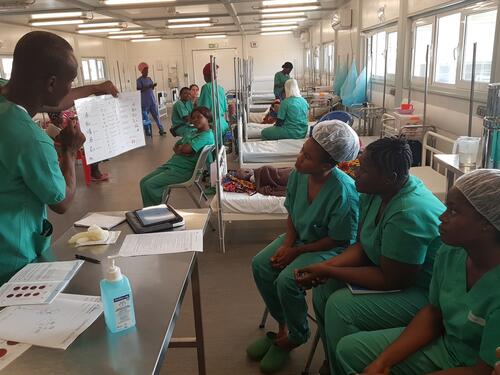
Anaesthetics scholarship for certified nurses
Surgical activities are a significant part of MSF’s work in hospitals, but there are too few trained nurse anaesthetists to assist during surgeries in many countries where we work. To help fill the gaps at project level, the MSF Academy for Healthcare has organised one-off scholarship programmes for qualified nurses to become specialised in anaesthesia through partnerships with quality schools in Africa.
A total of 35 state-registered nurses are today enrolled in two different programmes (one in English and one in French). A regular and close academic and individual follow up is provided by a MSF Academy-designated staff and future retention of the qualified staff has been secured through scholarship agreements.
Master in Medical Humanitarian Action (MHA)
Many MSF projects struggle to find experienced staff for medical management positions. The MSF Academy for Healthcare is developing a diploma programme, tailor-made for MSF PMR and medical coordinators.
The programme has been conceived around the competencies needed in MSF projects, and focuses on strategic management, quality analysis and support to the projects’ medical activities – these competencies are based on a framework for the profession of a medical coordinator.
Participants will complete more than 80 per cent of the course while working in the field for MSF, under the regular guidance of an experienced tutor.
- Distance learning adapted to the needs of the medical coordinator;
- On-the-job study in MSF projects, organised around a competency framework;
- To start in 2021 – for any information on the topic, please contact [email protected]
Post-Graduate Diploma in Infectious Diseases (120 credits)
Infectious diseases remain a major priority for MSF, and specific expertise in this field is often required in MSF projects, yet can be hard to find. A post-graduate diploma course is currently under development, and the first MSF participants may already been enrolled to some short courses in January 2021. How:
- In partnership with Stellenbosh University, Capetown, South-Africa;
- Content that is adapted to the clinical needs and conditions of MSF projects, especially on the African continent, enrolling an average of 15 medical doctors yearly;
- A curriculum composed of modules on adult infections, paediatrics infection, HIV and TB, surgical/trauma infections, and community health;
- A blended approach, with face-to-face intensive trainings, e-learning for theoretical learning and individual tutoring; and placements on MSF projects relevant to the different modules; more than 60 per cent of the learning will be based on practical clinical experience in the field, supported by specialised senior tutors.
Out-Patient Department (OPD) Consultations
Across MSF operations, over 10 million consultations are carried out per year in out-patients departments of health structures supported by MSF. The vast majority of these consultations are in fact carried out by staff without the adequate qualifications and training for such clinical work.
A competency framework was designed with the main focus on clinical decision-making, patient assessment skills and the therapeutic aspects; but also including preventive actions and environmental and supportive components in line with a patient-centered model of care. It will focus on:
- Efficient training of the healthcare workers (competency-based with a syndromic approach)
- Solid and continuous OPD supervision and support model in place
- The use of tools to support clinical decision-making
- Adapted Monitoring &Evaluation system towards quality of care, Including Iterative formative ‘performance evaluation and discussion (dashboards)’.
These interventions will have to be tailored to the specific targeted healthcare workers, taking into account their level of education and the context they work in. The training curriculum is being designed taking in consideration the field needs among MSF projects on primary health care.
The first pilot project is due to start at the end of the summer 2020 in Sierra Leone, after having been delayed of a few months due to the COVID-19 pandemic. The next pilot project should start a few months later in Guinea.
Governance
- A Programme Board has been set up in 2018 for major decisions on strategies and orientations, composed by direction members of OCB and OCBA
- Steering Committees, for specific initiatives of the MSF Academy
- Hosting section: Operational Centre of Brussels, Rue de l’Arbre Bénit 46, 1050 Ixelles, Belgium
Contact
Bart Janssens, Director
Bart Janssens is a medical doctor with interest and experience in tropical diseases and internal medicine and holds a MSc in Public Health. He has worked for the ICRC as a medical coordinator, and for MSF as a clinician, medical coordinator and, from 2011 to 2018, as director of operations. As a director of operations, he saw the strategic importance of professionalising the learning and training of medical professionals in MSF. This motivated him to take up the role of director of the MSF Academy for Healthcare.
Sabine Rens, Project Manager
Sabine Rens has a degree in International Relations and Masters degrees in Development and in Demography. After a career in the private sector, she held coordination positions with MSF in several countries and worked at headquarters for the departments of Human Resources, Analysis and Operations. She has also worked as country representative for the Clinton Foundation HIV/Aids Initiative in Mozambique and she developed the on-call service for general practitioners in the Belgian capital, Brussels. Throughout her career, she has always had a special interest in the development of human resources in the health sector; joining the MSF Academy in October 2018 has allowed her to dedicate her energy to this.
Delphine Evrard, Administrative Coordinator
Delphine can be contacted for general questions on the email above.
